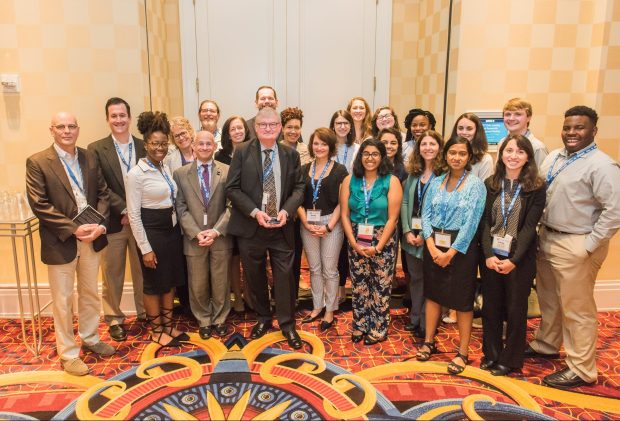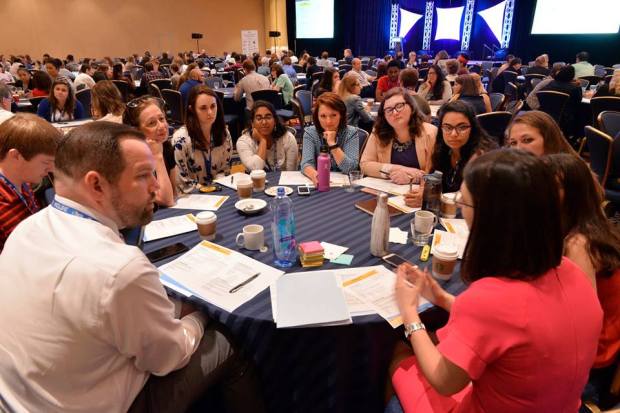2017 Civic Learning and Democratic Engagement Meeting Reflections: UMBC

A number of University of Maryland, Baltimore County (UMBC) faculty, staff, and students attended the 2017 Civic Learning and Democratic Engagement (CLDE) Meeting in June in Baltimore where they experienced and contributed to the exchange of ideas and knowledge that took place at the conference. Below are some reflections on their time at the conference. We encourage you to share your own experiences and reflections in the comments or by emailing adp@aascu.edu.

Photo by Marlayna Demond for UMBC (From left to right: Lee Boot, David Hoffman, Jessica Sackey, Bev Bickel, Scott Casper, Joby Taylor, Nancy Young, Craig Berger, Philip Rous, Tahira Mahdi, Corinne Janet, Romy Hübler, Lori Hardesty, Hannah Sadollah, Meghan Lynch, Manisha Vepa, Janae Cruz, Michele Wolff, Nitya Kumaran, Kaleigh Mrowka, Emily Melluso, Collin Sullivan, Josh Massey)
Corinne Janet, Coordinator of Student Life for Leadership Development
Eric Liu asserted in his CivEd Talk that “there’s no such thing as a problem that doesn’t relate to me.” I would really like our students (and our society at large) to think that way as well. I think a lot of white people write off the Black Lives Matter movement because “it doesn’t concern me.” But, of course it does. It concerns all of us. At UMBC’s student leadership retreat, we strive to increase empathy and understanding among students to the point that they see all social issues as relevant to them personally. I want to make sure we’re continuing this work and creating relevant connections between leadership and social identity.
Nitya Kumaran, Senator, Student Government Association
I came away from the CLDE meeting thinking about the advice I’d give to other students, and to my younger self, about how to make a difference. Among the ideas inspired by the meeting:
- You do not have to be the most experienced, most qualified person in the room to have something to contribute. “Believe in the ignorance of experts.” Ask questions, not because you have to be impressive, but because you are curious and the knowledge you gain is power.
- Assert that you are an equal. Your age does not negate your capacity to make valuable suggestions. There are more solutions than the ones you have been told about. Take your role as a student seriously, take your power seriously, take your resources seriously.
- Practice power with awareness. Each person is a catalyst of power; they have networks, are part of conduits. Learn to read and write power. Do I know of the conduits and can I write myself into the power structure?
- Remember that every interaction you have, you are creating and destroying ideas. You are telling someone you matter or you don’t matter in small ways. Every time you bring up something new in conversation, when you agree or disagree, you are spreading thoughts to someone else. That is power.
Kaleigh Mrowka, Assistant Director of Residential Life for Residential Education
I noticed that the conference seemed to be moving in two directions. Some people seemed to be there trying to “do the work,” by which I mean they were engaging in dialogue and trying to deepen and develop the idea of civic learning and democratic engagement. Others were there to showcase existing programs, sometimes implying that they had already resolved all the big questions. I think that tension makes sense for a group actively trying to advance theory and models in the field, but it meant that the plenary speakers and small sessions were sometimes poorly aligned. I was left thinking about how we could orient more people more effectively to the frontiers of the work.
Meghan Lynch, Vice President for Student Organizations, Student Government Association
I had a truly wonderful conversation about the 2016 election with a student from Fort Hays State University in Kansas. Like me, this student participated in leading his College Democrats club. In many ways, I feel that our discussion solved many of the problems of the world, maybe because we had enough in common that we were willing to be honest. We discussed the dynamic of a white working class, rural America that feels politically disenfranchised. I shared my research about gender bias in how voters regard candidates. We talked about Trump’s bluntness and matter-of-fact mannerisms (though the facts are debatable), and how that style speaks to many Midwesterners more effectively than the policy wonkiness of Hillary Clinton’s speeches.
Maybe there’s a larger lesson in the fact that many of my best CLDE meeting interactions happened in the in-between spaces, outside of formal sessions. I left those conversations truly believing that we have come to a pivotal moment in American history, and that it is time to be creative and understand that civic learning and democratic engagement must go beyond voter registration drives or get out the vote efforts. My mind is full of questions, and also the recognition that I have peers and mentors and a support team so great that if we put our minds together, change can and will happen.
Janae Cruz, Coordinator of Student Life for Student Engagement
At UMBC we aim to teach our students that the world, including UMBC, is not complete, and that they have the ability to shape and influence their environment. We want our students to leave UMBC understanding what it means to be civically engaged and to have a sense of agency. However, since the 2016 election I have wondered how we can succeed when our current system and administration leave so many people on all sides of the partisan divide feeling powerless.
I was inspired by the activity at the American Democracy Project organizing meeting in which we collected our thoughts about what constitutes a “thriving democracy” on Post-it notes. We discussed the need for feelings of influence, involving stakeholders, agency, representation, listening and hearing others, recognizing our biases and blind spots, understanding our differences, pushing aside partisanship in favor of what is right. So what would happen if today, and every day moving forward, we decided that instead of feeling powerless, we’re going to challenge our students to take a critical look at democracy, and challenge them (and ourselves) to make the changes we need, on our campus and beyond, in order for all of us to thrive? Is this a pipe dream? I don’t think so. I appreciated the chance to work through these questions alongside people who are also thinking about how we move forward post-November 2016.
Dan Barnhart, Director of Off-Campus Student Services
Campuses that have high civic engagement are ones that have strong relationships between students and faculty, have diversity and inclusion embedded in their culture, talk about politics and civic duty constantly, practice student agency, and have students who are active in questioning the system. I think for this conference to mean even more to our students, it should focus less on the electoral process and more on how students can be the change agents for both campus and country.
Collin Sullivan, undergraduate student
I went to CLDE with the expectation of continuing to have “woe is me” flashbacks of the 2016 presidential election. Instead, I came away with new inspiration and clarity, especially stemming from the plenary session in which we engaged in a deliberative dialogue about crime, safety, race, equality, and social justice. This is not a light conversation for anyone, but the structure and facilitation gave us the opportunity to hear from everyone at our table and benefit from their ideas, their stories, their experiences, their values, their mindset. How often do we do that? How often do we have deep conversations with people we may not necessarily see eye to eye with, and may not necessarily know all too well, and discuss threats to our democracy without arguing or getting frustrated? We need to listen and hear each other. We need to take action as this crazy world we live in isn’t going to fix itself.
David Hoffman, Assistant Director of Student Life for Civic Agency
At the closing plenary session, Sandy Rodriguez from the University of Nevada, Reno, shared a compelling story about her own vulnerability in a moment when she recognized a design flaw in one of her own programs. She said she had come to view a willingness to be vulnerable as a crucial disposition for participants in a thriving democracy. I agree. What I appreciated most about the CLDE meeting was being inspired by so many colleagues who were willing to go to a place of vulnerability about our collective work in order to consider how to deepen and extend it. These are sobering times for our democracy, but I left the meeting inspired about the possibilities ahead.
Manisha Vepa, Senator, Student Government Association
I heard some good ideas at the session on Education in Times of Democratic Crisis, facilitated by Elizabeth Gish and Leah Ashwill from Western Kentucky University. I especially liked their concept of citizen stories: basically, where they had their students interview community members to gain multiple ideas on what citizenship meant. I think this could have a lot of meaning if implemented correctly. It could go beyond just asking what did it mean to cast a ballot, illuminating instances of people’s frustration with the system and how they dealt with it. I also think it would be beneficial because students could hear opinions outside of a college campus. Especially at UMBC, there seem to be some generally accepted ideas about what being a citizen means. It would be great to get different perspectives. I can imagine this being an oral interview project that culminates in some sort interactive map or other final project. Or even just a senior graduation requirement: something for students to consider as they continue on in the world.
Craig Berger, Coordinator of Student Life for Campus and Civic Engagement
As we noted the increased urgency of civic engagement work at the 2017 Civic Learning and Democratic Engagement meeting, one thought-provoking observation offered by a conference participant stays with me. The commenter observed an interesting and concerning dynamic in our conversations: While we often speak in civic engagement circles about the importance of preparing “our” students for the future (as if we own them), we tend to forget our ability to engage them as the civic agents they are right now. I left our meeting realizing that not only should we focus more on the present in our work (e.g., How can we build campus cultures on the idea of teaching democratic engagement through the co-creation of our respective campuses?), but also that tackling this work with a focus on the present makes it easier to embrace the unique humanity of the students with whom we are working, leading to a more robust and engaging learning experience.

(Clockwise from the left: Craig Berger, Collin Sullivan, Nancy Young, Kaleigh Mrowka, Manisha Vepa, Romy Hübler, Meghan Lynch, Hannah Sadollah, Lori Hardesty, unidentified, Corinne Janet)



